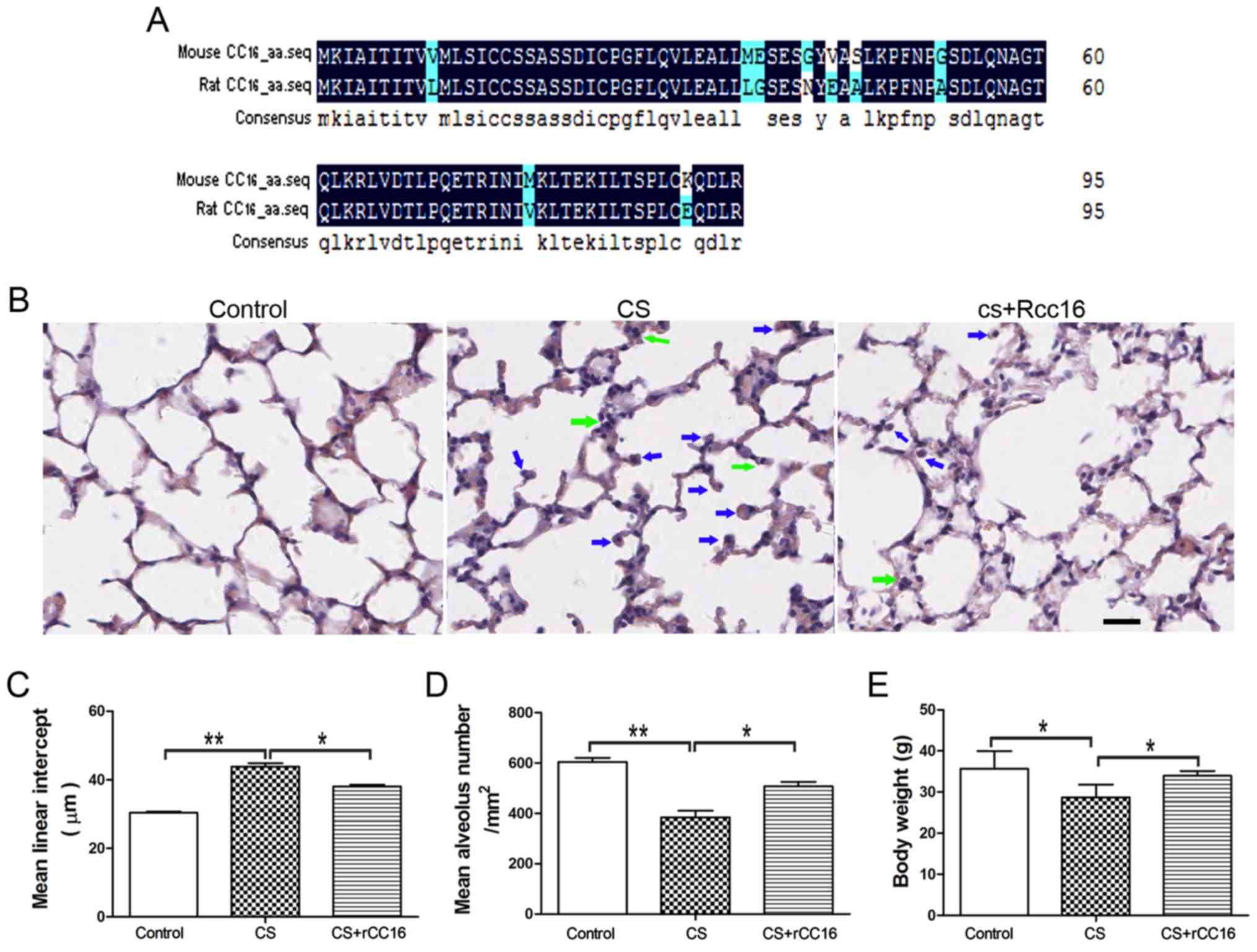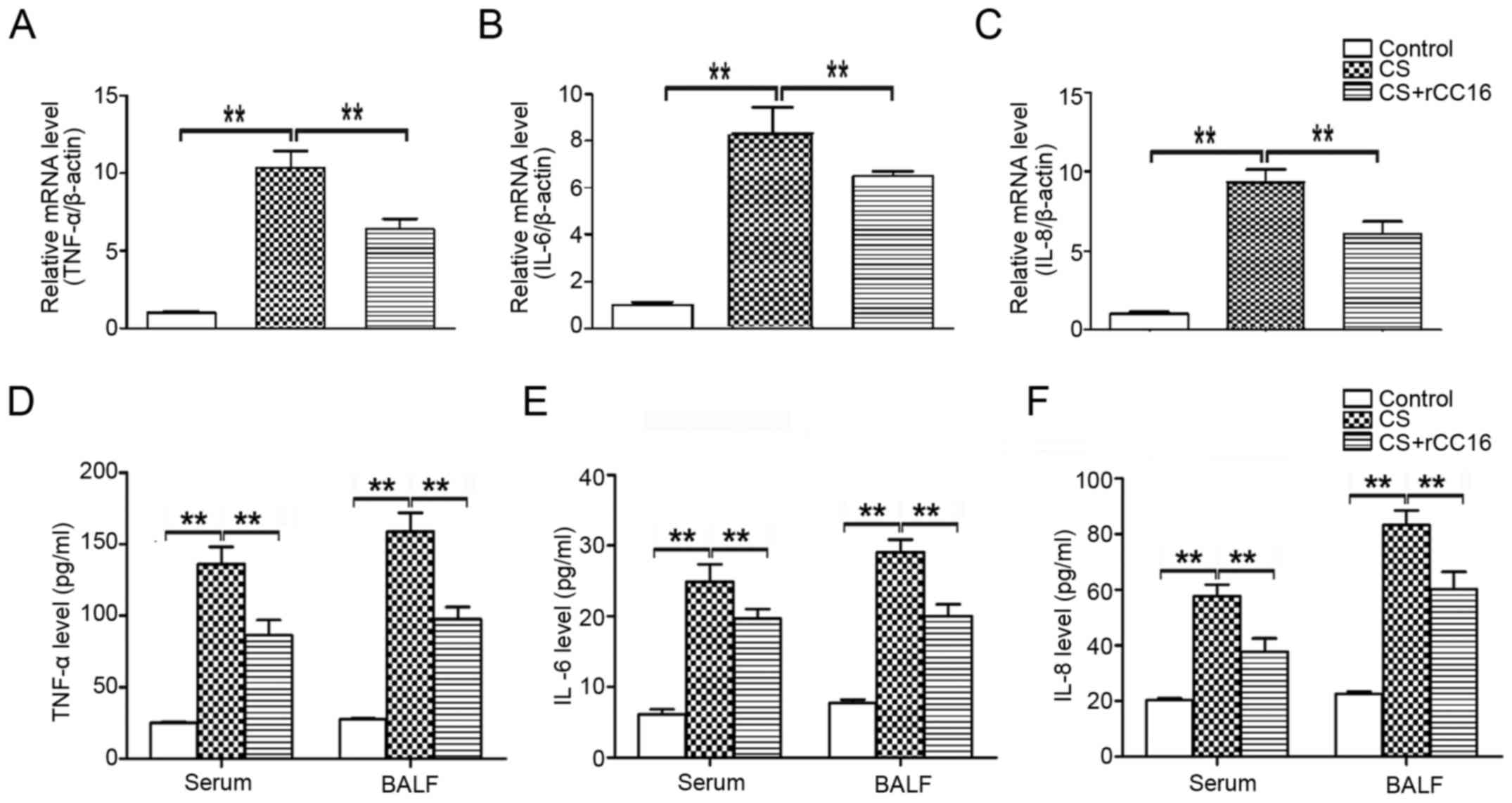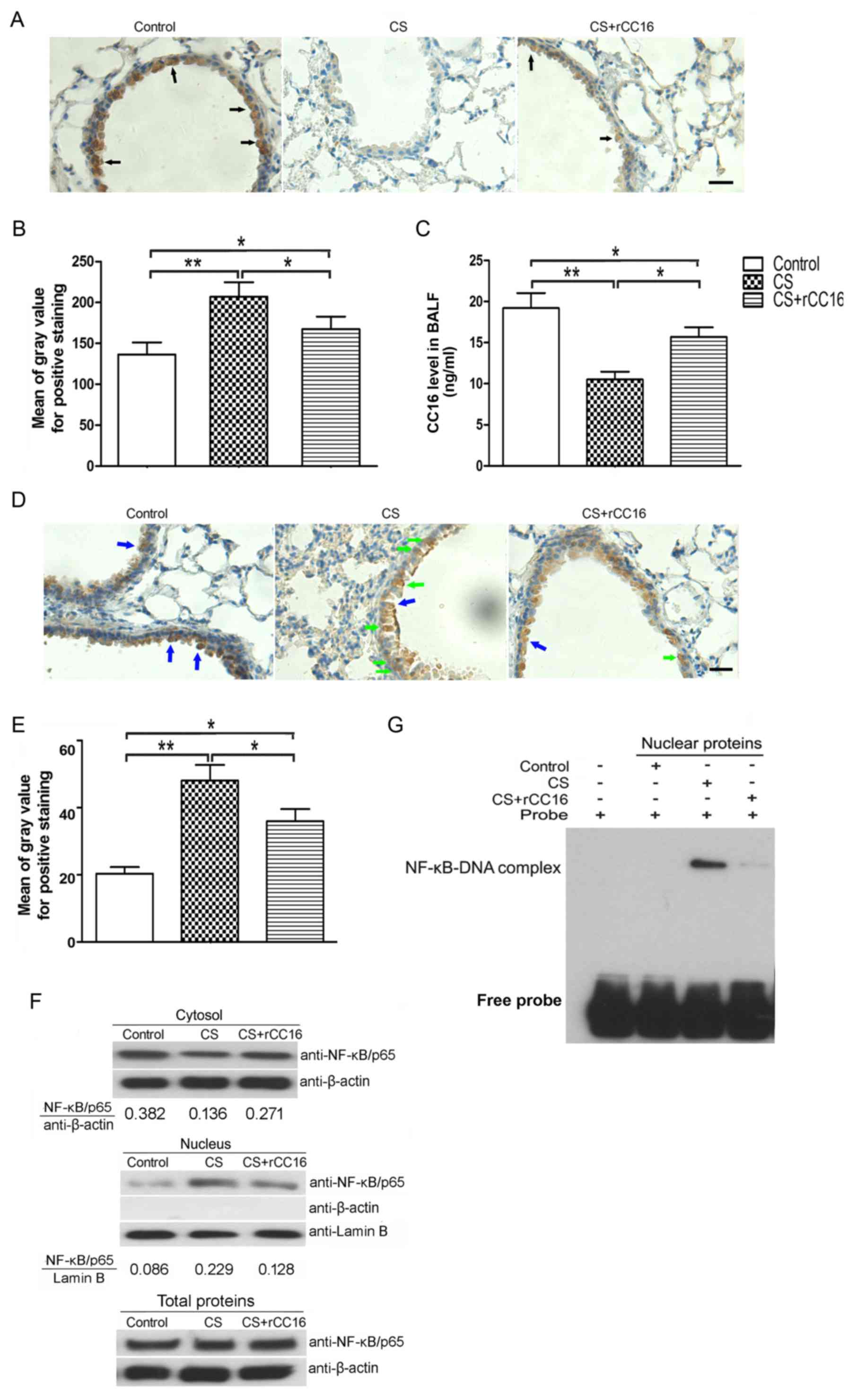|
1
|
Khan MA, Kianpour S, Stämpfli MR and
Janssen LJ: Kinetics of in vitro bronchoconstriction in an
elastolytic mouse model of emphysema. Eur Respir J. 30:691–700.
2007. View Article : Google Scholar : PubMed/NCBI
|
|
2
|
Van Dijk EM, Culha S, Menzen MH, Bidan CM
and Gosens R: Elastase-induced parenchymal disruption and airway
hyper responsiveness in mouse precision cut lung slices: Toward an
ex vivo COPD model. Front Physiol. 7:6572016.PubMed/NCBI
|
|
3
|
Rabe KF, Hurd S, Anzueto A, Barnes PJ,
Buist SA, Calverley P, Fukuchi Y, Jenkins C, Rodriguez-Roisin R,
van Weel C, et al: Global strategy for the diagnosis, management
and prevention of chronic obstructive pulmonary disease: GOLD
executive summary. Am J Respir Crit Care Med. 176:532–555. 2007.
View Article : Google Scholar : PubMed/NCBI
|
|
4
|
Hogg JC, Chu F, Utokaparch S, Woods R,
Elliott WM, Buzatu L, Cherniack RM, Rogers RM, Sciurba FC, Coxson
HO and Paré PD: The nature of small-airway obstruction in chronic
obstructive pulmonary disease. N Engl J Med. 350:2645–2653. 2004.
View Article : Google Scholar : PubMed/NCBI
|
|
5
|
Barnes PJ: Alveolar macrophages as
orchestrators of COPD. Copd. 1:59–70. 2004. View Article : Google Scholar : PubMed/NCBI
|
|
6
|
Barnes PJ: Inflammatory mechanisms in
patients with chronic obstructive pulmonary disease. J Allergy Clin
Immunol. 138:16–27. 2016. View Article : Google Scholar : PubMed/NCBI
|
|
7
|
Di Marco F, Santus P, Scichilone N,
Solidoro P, Contoli M, Braido F and Corsico AG: Symptom variability
and control in COPD: Advantages of dual bronchodilation therapy.
Respir Med. 125:49–56. 2017. View Article : Google Scholar : PubMed/NCBI
|
|
8
|
Barnes PJ: Corticosteroid resistance in
patients with asthma and chronic obstructive pulmonary disease. J
Allergy Clin Immunol. 131:636–645. 2013. View Article : Google Scholar : PubMed/NCBI
|
|
9
|
Lee JH, Koo TH, Yoon H, Jung HS, Jin HZ,
Lee K, Hong YS and Lee JJ: Inhibition of NF-kappa B activation
through targeting I kappa B kinase by celastrol, a quinone methide
triterpenoid. Biochem Pharmacol. 72:1311–1321. 2006. View Article : Google Scholar : PubMed/NCBI
|
|
10
|
Park HJ, Kim IT, Won JH, Jeong SH, Park
EY, Nam JH, Choi J and Lee KT: Anti-inflammatory activities of
ent-16alphaH,17-hydroxy-kauran-19-oic acid isolated from the roots
of Siegesbeckia pubescens are due to the inhibition of iNOS and
COX-2 expression in RAW 264.7 macrophages via NF-kappaB
inactivation. Eur J Pharmacol. 558:185–193. 2007. View Article : Google Scholar : PubMed/NCBI
|
|
11
|
Caramori G, Romagnoli M, Casolari P,
Bellettato C, Casoni G, Boschetto P, Chung KF, Barnes PJ, Adcock
IM, Ciaccia A, et al: Nuclear localisation of p65 in sputum
macrophages but not in sputum neutrophils during COPD
exacerbations. Thorax. 58:348–351. 2003. View Article : Google Scholar : PubMed/NCBI
|
|
12
|
Di Stefano A, Caramori G, Oates T, Capelli
A, Lusuardi M, Gnemmi I, Ioli F, Chung KF, Donner CF, Barnes PJ and
Adcock IM: Increased expression of nuclear factor-kappaB in
bronchial biopsies from smokers and patients with COPD. Eur Respir
J. 20:556–563. 2002. View Article : Google Scholar : PubMed/NCBI
|
|
13
|
Zhuan B, Yu Y, Yang Z, Zhao X and Li P:
Mechanisms of oxidative stress effects of the NADPH
oxidase-ROS-NF-κB transduction pathway and VPO1 on patients with
chronic obstructive pulmonary disease combined with pulmonary
hypertension. Eur Rev Med Pharmacol Sci. 21:3459–3464.
2017.PubMed/NCBI
|
|
14
|
Edwards MR, Bartlett NW, Clarke D, Birrell
M, Belvisi M and Johnston SL: Targeting the NF-kappaB pathway in
asthma and chronic obstructive pulmonary disease. Pharmacol Ther.
121:1–13. 2009. View Article : Google Scholar : PubMed/NCBI
|
|
15
|
Nogaki T, Asano K, Furuta A, Kanai K,
Suzaki I, Kanei A and Suzaki H: Enhancement of clara cell 10-kD
protein (CC10) production from nasal epithelial cells by
fexofenadine hydrochloride. Asian Pac J Allergy Immunol.
30:139–145. 2012.PubMed/NCBI
|
|
16
|
Mukherjee AB, Kundu GC, Mantile-Selvaggi
G, Yuan CJ, Mandal AK, Chattopadhyay S, Zheng F, Pattabiraman N and
Zhang Z: Uteroglobin: A novel cytokine? Cell Mol Life Sci.
55:771–787. 1999. View Article : Google Scholar : PubMed/NCBI
|
|
17
|
Johansson S, Keen C, Ståhl A, Wennergren G
and Benson M: Low levels of CC16 in nasal fluid of children with
birch pollen-induced rhinitis. Allergy. 60:638–642. 2005.
View Article : Google Scholar : PubMed/NCBI
|
|
18
|
Wang H, Long XB, Cao PP, Wang N, Liu Y,
Cui YH, Huang SK and Liu Z: Clara cell 10-kD protein suppresses
chitinase 3-like 1 expression associated with eosinophilic chronic
rhinosinusitis. Am J Respir Crit Care Med. 181:908–916. 2010.
View Article : Google Scholar : PubMed/NCBI
|
|
19
|
Long XB, Hu S, Wang N, Zhen HT, Cui YH and
Liu Z: Clara cell 10-kDa protein gene transfection inhibits NF-κB
activity in airway epithelial cells. PLoS one. 7:e359602012.
View Article : Google Scholar : PubMed/NCBI
|
|
20
|
Van Vyve T, Chanez P, Bernard A, Bousquet
J, Godard P, Lauwerijs R and Sibille Y: Protein content in
bronchoalveolar lavage fluid of patients with asthma and control
subjects. J Allergy Clin Immunol. 95:60–68. 1995. View Article : Google Scholar : PubMed/NCBI
|
|
21
|
Pang M, Wang H, Bai JZ, Cao D, Jiang Y,
Zhang C, Liu Z, Zhang X, Hu X, Xu J and Du Y: Recombinant rat CC16
protein inhibits LPS-induced MMP-9 expression via NF-kappaB pathway
in rat tracheal epithelial cells. Exp Biol Med. 240:1266–1278.
2015. View Article : Google Scholar
|
|
22
|
Pang M, Yuan Y, Wang D, Li T, Wang D, Shi
X, Guo M, Wang C, Zhang X, Zheng G, et al: Recombinant CC16 protein
inhibits the production of pro-inflammatory cytokines via NF-kappaB
and p38 MAPK pathways in LPS-activated RAW264.7 macrophages. Acta
biochimica et biophysica Sinica. 1–9. 2017.
|
|
23
|
Bayne K: Revised Guide for the Care and
Use of Laboratory Animals available. American Physiological
Society. Physiologist. 39(199): 208–111. 1996.
|
|
24
|
Ma R, Gong X, Jiang H, Lin C, Chen Y, Xu
X, Zhang C, Wang J, Lu W and Zhong N: Reduced nuclear translocation
of serum response factor is associated with skeletal muscle atrophy
in a cigarette smoke-induced mouse model of COPD. Int J Chron
Obstruct Pulmon Dis. 12:581–587. 2017. View Article : Google Scholar : PubMed/NCBI
|
|
25
|
Wolfson MR, Funanage VL, Kirwin SM, Pilon
AL, Shashikant BN, Miller TL and Shaffer TH: Recombinant human
Clara cell secretory protein treatment increases lung mRNA
expression of surfactant proteins and vascular endothelial growth
factor in a premature lamb model of respiratory distress syndrome.
Am J Perinatol. 25:637–645. 2008. View Article : Google Scholar : PubMed/NCBI
|
|
26
|
Levine CR, Gewolb IH, Allen K, Welch RW,
Melby JM, Pollack S, Shaffer T, Pilon AL and Davis JM: The safety,
pharmacokinetics and anti-inflammatory effects of intratracheal
recombinant human Clara cell protein in premature infants with
respiratory distress syndrome. Pediatr Res. 58:15–21. 2005.
View Article : Google Scholar : PubMed/NCBI
|
|
27
|
Chilkoti A, Tan PH and Stayton PS:
Site-directed mutagenesis studies of the high-affinity
streptavidin-biotin complex: Contributions of tryptophan residues
79, 108 and 120. Proc Natl Acad Sci USA. 92:1754–1758. 1995.
View Article : Google Scholar : PubMed/NCBI
|
|
28
|
Livak KJ and Schmittgen TD: Analysis of
relative gene expression data using real-time quantitative PCR and
the 2−ΔΔCT method. Methods. 25:402–408. 2001.
View Article : Google Scholar : PubMed/NCBI
|
|
29
|
Yan C, Wang H, Aggarwal B and Boyd DD: A
novel homologous recombination system to study 92 kDa type IV
collagenase transcription demonstrates that the NF-kappaB motif
drives the transition from a repressed to an activated state of
gene expression. FASEB J. 18:540–541. 2004. View Article : Google Scholar : PubMed/NCBI
|
|
30
|
Laucho-Contreras ME, Polverino F,
Tesfaigzi Y, Pilon A, Celli BR and Owen CA: Club cell protein 16
(CC16) augmentation: A potential disease-modifying approach for
chronic obstructive pulmonary disease (COPD). Expert Opin Ther
Targets. 20:869–883. 2016. View Article : Google Scholar : PubMed/NCBI
|
|
31
|
Nicholas A, Jeon H, Selasi GN, Na SH, Kwon
HI, Kim YJ, Choi CW, Kim SI and Lee JC: Clostridium
difficile-derived membrane vesicles induce the expression of
pro-inflammatory cytokine genes and cytotoxicity in colonic
epithelial cells in vitro. Microb Pathog. 107:6–11. 2017.
View Article : Google Scholar : PubMed/NCBI
|
|
32
|
Nishino R, Fukuyama T, Watanabe Y,
Kurosawa Y, Kosaka T and Harada T: Significant upregulation of
cytokine secretion from T helper type 9 and 17 cells in a NC/Nga
mouse model of ambient chemical exposure-induced respiratory
allergy. J Pharmacol Toxicol Methods. 80:35–42. 2016. View Article : Google Scholar : PubMed/NCBI
|
|
33
|
Shen LL, Liu YN, Shen HJ, Wen C, Jia YL,
Dong XW, Jin F, Chen XP, Sun Y and Xie QM: Inhalation of
glycopyrronium inhibits cigarette smoke-induced acute lung
inflammation in a murine model of COPD. Int Immunopharmacol.
18:358–364. 2014. View Article : Google Scholar : PubMed/NCBI
|
|
34
|
Irander K, Palm JP, Borres MP and Ghafouri
B: Clara cell protein in nasal lavage fluid and nasal nitric
oxide-biomarkers with anti-inflammatory properties in allergic
rhinitis. Clin Mol Allergy. 10:42012. View Article : Google Scholar : PubMed/NCBI
|
|
35
|
Bernard A, Marchandise FX, Depelchin S,
Lauwerys R and Sibille Y: Clara cell protein in serum and
bronchoalveolar lavage. Eur Respir J. 5:1231–1238. 1992.PubMed/NCBI
|
|
36
|
Lomas DA, Silverman EK, Edwards LD,
Locantore NW, Miller BE, Horstman DH and Tal-Singer R: Evaluation
of COPD Longitudinally to Identify Predictive Surrogate Endpoints
study investigators: Serum surfactant protein D is steroid
sensitive and associated with exacerbations of COPD. Eur Respir J.
34:95–102. 2009. View Article : Google Scholar : PubMed/NCBI
|
|
37
|
Pilette C, Godding V, Kiss R, Delos M,
Verbeken E, Decaestecker C, De Paepe K, Vaerman JP, Decramer M and
Sibille Y: Reduced epithelial expression of secretory component in
small airways correlates with airflow obstruction in chronic
obstructive pulmonary disease. Am J Respir Crit Care Med.
163:185–194. 2001. View Article : Google Scholar : PubMed/NCBI
|
|
38
|
Laucho-Contreras ME, Polverino F, Gupta K,
Taylor KL, Kelly E, Pinto-Plata V, Divo M, Ashfaq N, Petersen H,
Stripp B, et al: Protective role for club cell secretory protein-16
(CC16) in the development of COPD. Eur Respir J. 45:1544–1556.
2015. View Article : Google Scholar : PubMed/NCBI
|
|
39
|
Chen J, Lam S, Pilon A, McWilliams A,
Macaulay C and Szabo E: Higher levels of the anti-inflammatory
protein CC10 are associated with improvement in bronchial dysplasia
and sputum cytometric assessment in individuals at high risk for
lung cancer. Clin Cancer Res. 14:1590–1597. 2008. View Article : Google Scholar : PubMed/NCBI
|
|
40
|
Zhu L, Di PY, Wu R, Pinkerton KE and Chen
Y: Repression of CC16 by cigarette smoke (CS) exposure. PLoS One.
10:e01161592015. View Article : Google Scholar : PubMed/NCBI
|
|
41
|
Miller TL, Shashikant BN, Melby JM, Pilon
AL, Shaffer TH and Wolfson MR: Recombinant human Clara cell
secretory protein in acute lung injury of the rabbit: effect of
route of administration. Pediatr Crit Care Med. 6:698–706. 2005.
View Article : Google Scholar : PubMed/NCBI
|
|
42
|
Ma H, Wang H, Luo Y, Guo S and Song C:
Mir-20b-induced increase in myeloid-derived suppressor cells in the
lungs of mice with chronic asthma. Ann Clin Lab Sci. 47:76–82.
2017.PubMed/NCBI
|
|
43
|
Reno FE, Normand P, McInally K, Silo S,
Stotland P, Triest M, Carballo D and Piché C: A novel nasal powder
formulation of glucagon: Toxicology studies in animal models. BMC
Pharmacol Toxicol. 16:292015. View Article : Google Scholar : PubMed/NCBI
|
|
44
|
Drost EM and MacNee W: Potential role of
IL-8, platelet-activating factor and TNF-alpha in the sequestration
of neutrophils in the lung: Effects on neutrophil deformability,
adhesion receptor expression and chemotaxis. Eur J Immunol.
32:393–403. 2002. View Article : Google Scholar : PubMed/NCBI
|
|
45
|
Gibson PG, Simpson JL and Saltos N:
Heterogeneity of airway inflammation in persistent asthma: Evidence
of neutrophilic inflammation and increased sputum interleukin-8.
Chest. 119:1329–1336. 2001. View Article : Google Scholar : PubMed/NCBI
|
|
46
|
Kaku Y, Imaoka H, Morimatsu Y, Komohara Y,
Ohnishi K, Oda H, Takenaka S, Matsuoka M, Kawayama T, Takeya M, et
al: Overexpression of CD163, CD204 and CD206 on alveolar
macrophages in the lungs of patients with severe chronic
obstructive pulmonary disease. PLoS One. 9:e874002014. View Article : Google Scholar : PubMed/NCBI
|
|
47
|
Shapiro SD: The macrophage in chronic
obstructive pulmonary disease. Am J Respir Crit Care Med.
160:S29–S32. 1999. View Article : Google Scholar : PubMed/NCBI
|
|
48
|
Oeckinghaus A, Hayden MS and Ghosh S:
Crosstalk in NF-κB signaling pathways. Nat Immunol. 12:695–708.
2011. View Article : Google Scholar : PubMed/NCBI
|
|
49
|
Zhao L, Song Y, Pu J, Guo J, Wang Y, Chen
Z, Chen T, Gu Y and Jia G: Effects of repeated Cr (VI)
intratracheal instillation on club (Clara) cells and activation of
nuclear factor-kappa B pathway via oxidative stress. Toxicol Lett.
231:72–81. 2014. View Article : Google Scholar : PubMed/NCBI
|
|
50
|
Song W, Liu G, Bosworth CA, Walker JR,
Megaw GA, Lazrak A, Abraham E, Sullender WM and Matalon S:
Respiratory syncytial virus inhibits lung epithelial Na+
channels by up-regulating inducible nitric-oxide synthase. J Biol
Chem. 284:7294–7306. 2009. View Article : Google Scholar : PubMed/NCBI
|
|
51
|
Baeuerle PA and Henkel T: Function and
activation of NF-kappa B in the immune system. Annu Rev Immunol.
12:141–179. 1994. View Article : Google Scholar : PubMed/NCBI
|
|
52
|
Sahebjami H and Sathianpitayakul E:
Influence of body weight on the severity of dyspnea in chronic
obstructive pulmonary disease. Am J Respir Crit Care Med.
161:886–890. 2000. View Article : Google Scholar : PubMed/NCBI
|

















